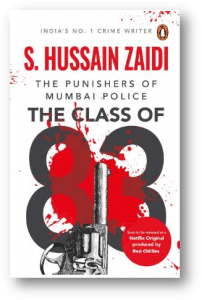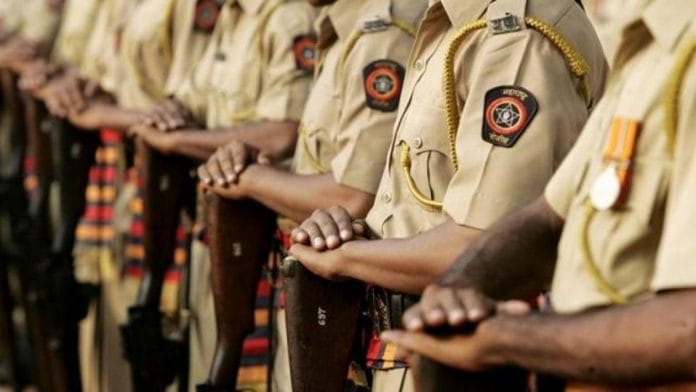Near the end of his training period, every police recruit is consumed by a single concern: his first posting. Each policeman has his own ideas and expectations. Some want to serve in or around their hometowns to be near their families. Some hope to get posted in conflict zones like Naxalite areas, where risk is paralleled only by accolades. And yet, there are others who want ‘cream’ postings where money and influence can be accumulated in little time and in large quantities.
In the late 1980s, there was only one destination of choice for ambitious, young policemen: Mumbai.
The underworld in Mumbai at the time was flourishing with extortion rackets. Gangsters like Karim Lala, Babu Reshim and Rajan Nair, also known as Bada Rajan, were waging war against each other to establish their supremacy over the city. The Pathan gangs and Dawood Ibrahim were also locked in a violent battle. Blood spilled freely on the Mumbai streets. Contract killings were the order of the day. The citizens were getting restless, and the police were getting desperate.
Just a year before the batch of 83 graduated from MPA at Nashik, Mumbai had witnessed its first encounter killing.
Manohar Surve, alias Manya, a young resident of Dadar who went from being a college class topper to a dreaded dacoit, had been gunned down in Wadala on 11 January 1982. Manya, among the few educated members of the underworld, had managed to hold his own in the city for two years despite organized crime gangs springing up all around him.
Also read: Not just Delhi, there is growing disconnect between police leadership & constabulary in India
…
Out of 450 cadets in the 83 batch, around ninety were posted in Mumbai. To [Pradeep] Sharma’s supreme disappointment, his first posting was with the Airport Police Station in the western suburbs. The Airport Police Station was formed primarily to take care of matters pertaining to the domestic terminal (now known as Chhatrapati Shivaji International Airport). The occasional accident or murder in its jurisdiction extends a little beyond the domestic terminal’s boundaries. In a city ripe with opportunity, the Airport Police Station was hardly a worthy posting. Even Sharma’s reporting head at the time realized that this was a colossal waste of Sharma’s talent and abilities. Sharma was advised to ask for another posting.
With some trepidation, Sharma approached Julio Ribeiro, then Commissioner of Police, and expressed his concerns. Ribeiro’s strong persona and aura flummoxed the rookie officer. ‘Why do you want to change your posting?’ Ribeiro curtly asked Sharma. Sharma gathered his wits and blurted out an answer. ‘Sir, I came to Mumbai to fight organized crime,’ he said, haltingly. ‘Here I am only watching the airport visitors.’ Ribeiro glanced sharply at Sharma, measuring the intensity of Sharma’s sincerity and intentions. Then Ribeiro bent towards his desk and scribbled something on a file which Sharma could not comprehend until days later when he received a letter. To Sharma’s relief, Ribeiro had not only agreed to the change but also posted him close to Sharma’s bachelor quarters in Bandra, also known as the queen of the suburbs.
And so, on the fifteenth day of his service, Sharma reported to Senior PI Ismail Rajguru in charge of the Mahim Police Station—one of the most ‘active spots’ as far as the underworld or organized crime is concerned. Rajguru was the next to use his X-ray eyes to scan Sharma’s bubbling enthusiasm. Although a greenhorn, Rajguru had a hunch that if groomed properly, Sharma would go on to establish a stellar career. Sharma remembers Rajguru as a ‘good man’ who was very supportive and taught him a lot.
Also read: After chor-police for 36 years, Mumbai’s ‘Dirty Harry’ set to begin political innings now
Mahim is still classified as a ‘communally sensitive’ area— cop speak for areas where members of the Muslim community reside in large numbers—due to the Makhdoom Ali Mahimi Dargah, commonly known as the Mahim dargah. The priority for any cop posted at Mahim is to have as many eyes and ears on the ground as possible.
Thus, Sharma’s first lesson on the job was the backbone of policing: gathering informants. Policemen, while admitting the advantages of technology like CCTV cameras, cellular location mapping, DNA tests and forensic analysis, will never stop swearing by their informants. Some of the biggest cases have been solved and the most serious crimes prevented because of tip offs provided by the informant network which is almost an institution.
Rajguru gave Sharma a police van and two constables who were well versed in policing as well as familiar with the Mahim jurisdiction. But Sharma had to learn to fish for himself. ‘Go out in the field and build your own information network,’ Rajguru said. Sharma started small. Pickpocketing was rampant on the streets at the time. Scores of complaints were lodged every day.
Under Rajguru’s guidance, Sharma’s quest began with picking up all the history sheeters in the area known to pick pockets for a living. The pickpockets had demarcated their areas of operation so that they could work without disrupting each other’s flow of income—a symbiotic system of survival that exists even today.
With the help of the constables, Sharma matched names of the suspects to their areas. Then, he went after all of them. He began with one man, and that one man led Sharma to four others, who in turn led him to ten others. With each suspect that he picked up, Sharma put to action all the theoretical knowledge about interrogation that he had learnt, identifying when to use force and when to use skill. Soon, he had results. The suspects started confessing and Sharma could place them under arrest, solving cases and earning a reputation for himself. Every night, Sharma would make detailed notes in his diary about the people he had arrested, the ones he still had to, the number of cases against each one, known associates, modus operandi, area of operations and every other detail. The word of his diary spread among the history sheeters.
Also read: The 6ft wrestler who made a scrawny Dawood Ibrahim India’s biggest don
On the streets of Mahim, the average pickpocket shivered at the thought of his name cropping up in Sharma’s dreaded diary. Sharma’s day at work often extended beyond fourteen hours. In a span of three months, he put sixty to seventy pickpockets behind bars. Information kept pouring in and Sharma’s interest deepened. It wasn’t long before the suspects started doubling up as informants.
Trusting his instinct, Sharma took three to four pickpockets under his wing, adopting the ‘good cop’ attitude with them, taking care of their small needs and assuring them protection as long as they helped him in return. The pickpockets were only too happy to pass on whatever they gathered through their own network in exchange for leniency and other benefits. Soon, Sharma knew who to turn to every time a big theft occurred in the Mahim police’s jurisdiction. Policemen across the globe will agree that informants have different motivations. There are a few, although only few, who genuinely want to play their part in fighting crime in their respective areas and are also able to pick up the local grapevine, which they then pass on to policemen they trust. Others do it to put their rivals out of business, and while the police know this, they are fine with it if it keeps the crime graph in check.
When he was not busy turning suspects into sources, Sharma was also out on the streets. Watching. Listening. Absorbing. Sometimes, he would break up a fight before it escalated. At other times, he would intervene in local disputes and ensure law and order was maintained. Through all of this, he constantly made new friends and invested time and energy into broadening his network. Sharma did not know that these seemingly trivial acts would one day manifest into bigger successes, and he would soon reap the first fruit of his labour.
 This excerpt from S. Hussain Zaidi’s, Class Of 83: The Punishers of Mumbai Police has been published with permission from Penguin Random House India.
This excerpt from S. Hussain Zaidi’s, Class Of 83: The Punishers of Mumbai Police has been published with permission from Penguin Random House India.






